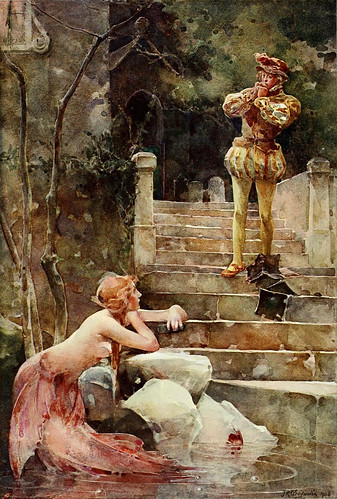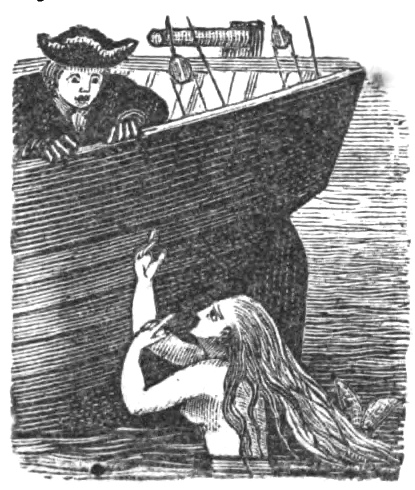 |
| J.R. Weguelin (1849-1927), The Mermaid Discovered |
'I have heard the mermaids singing, each to each. I do not think that they will sing to me.' –T.S. Eliot
On various lists here and there, this fanciful fairytale name is explained as '"mermaid" in Cornish.' It appears to lack history of use as a given name – I've yet to find a single Morvoren or Morveren, from Cornwall or anywhere else* – but lest ye forget, until recently, 'modern classic' Lorelei was simply the German name for a rock in the Rhine and the legendary Rhine Maidens associated with it. Like Germany's Lorelei and the similar Sirens of classical mythology, a morvoren was a thing to be feared; but even if the Cornish regarded their mermaids as omens of bad luck, '[believing] they could take such shapes as suited their purpose, and that they had often allured men to live with them,' this makes for an intriguing, whimsical moniker, similar in feel to established names like Morvern and Morven, and boasts a sufficiently colorful back-story.
Morvoren (or Morveren) is a modern feminine name borrowed from Cornish folklore. Said to mean 'mermaid' in Cornish from mor 'sea' and voren, aspirated form of moren 'maiden', it is associated with the Mermaid of Zennor, the subject of a mysterious local legend from the small coastal village in West Cornwall. Inside the medieval Church of St Senara in sleepy Zennor (2001 population: 217) is the Mermaid Chair, a bench or pew made famous by the mermaid carving in its side, reputed to be over 600 years old. She holds in one hand what is apparently a glass or mirror; 'in British tales, the mermaid is fancied to carry a glass in one hand, and in the other a comb, with which she combs her beautiful hair.' Little is known about the chair's origins, but it is popularly believed to coincide with the legend of a mermaid who disappeared with a Zennor man once upon a time. Here is a version of the story:
Long ago, the people of Zennor were renowned for both their healing powers and their singing ability. Occasionally a beautiful young woman would appear at the chapel. She sang with the sweetest voice the villagers had ever heard. They would watch in astonishment as she left over the hill, sometimes disappearing for months or years at a time, only to return looking the same age and with the same wonderful singing voice.
 |
| 'Please raise the anchor...' |
The last native Cornish speaker – thus, the last person who would have used the word morvoren to describe this antiheroine – was probably John Davey, a Zennor man who died in 1891.
In 1904 the Cornish language revival formally began with the publication of Handbook of the Cornish Language by cultural activist Henry Jenner, who had the previous year been initiated as a Bard of the Cornish Gorseth, a revivalist group; when Jenner's wife, Kitty Lee joined the society, also in 1904, she assumed the Bardic name Morvoren. (Becoming a member of the Gorseth involves adopting a Cornish-language pseudonym that somehow reflects its bearer's interests or career, place of origin, family connections, etc.)
Today the language is somewhat revitalized and exists in several modern forms, which officially use mórwerghes for 'mermaid' instead. So, Morvoren isn't to Cornwall what a woman named Sirène would be to France, or a Sjöjungfrun to Sweden, or a... you get my drift; it's far from being the kind of literal-vocabulary-word-name that merits eyebrow raising.
Cornish composer Philip Cannon (1929-) may have been the first to make Morvoren the folk character's name rather than her race, in his 1964 two-act opera Morvoren celebrating the local legend. In her 1981 retelling of the Zennor story, Shirley Climo also names the mermaid Morveren (perhaps a simplified or more Anglo form of Morvoren) and adds that she is a daughter of the Welsh sea-god King Llyr. Since Cornish nearly always emphasizes the second-to-last syllable, Morvoren would be said more VORE en, whereas Morveren I imagine is MORE vur un: the more intuitive pronunciation for English-speakers.
The enigmatic Mermaid of Zennor has inspired the novel The Mermaid Chair (2005) by Sue Monk Kidd (adapted to a Kim Basinger movie the following year) and the gorgeous song 'Morveren's Lullaby' (2010) by Isobel Anderson. (Have a listen:)
Morveren joins the swelling ranks of dramatic, yet perfectly wearable, folklore-inspired baby names, including Ondine, Melusine and Valkyrie, and could also be counted among the Cornish word names (Elowen, Steren, Kerensa) coined out of the cultural revival of the last century. Does the meaning behind Morveren redeem her her lack of history as a personal name? Just maybe.
*EDIT (May 2012) Actually, in England and Wales, Morvoren has been used as a given name at least 11 times!
Also, I thought I'd share two related names I've since come across, both recent coinages: Morforwyn (or Morvorwyn), the Welsh equivalent; and Cosvoren, meaning 'wood nymph' (from Cornish cos 'wood' and moren 'maiden'). ♥
For more:
- 'Romances of the Mermaids: Morva or Morveth', from Popular Romances of the West of the England by Robert Hunt (1903)
- The Mermaid Myth and Merrymaids
- Useful Cornish links, Cornish folklore links and Cornish names
No comments:
Post a Comment